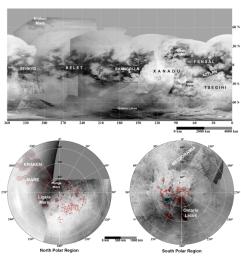These updated maps of Saturn's moon Titan, consisting of data from the Cassini imaging science subsystem, include Cassini's August 2008 imaging of the moon's northern hemisphere.
Evidence from Cassini's imaging science subsystem, radar, and visual and infrared mapping spectrometer instruments strongly suggests that dark areas near the poles are lakes of liquid hydrocarbons-an analysis affirmed by images capturing those changes in the lakes thought to be brought on by rainfall.
Colored lines in the polar portions of these maps illustrate the boundaries between surface regions having different albedos— or differences in surface brightness—which Cassini scientists have interpreted as potential shorelines. Blue outlines indicate features that changed between observations made one year apart (see PIA11147).
The top map is a simple cylindrical projection. Atmospheric effects complicate incorporation of data from high northern latitudes, which are shown separately in a polar view. The map at bottom left is a north polar projection showing latitudes 55 degrees to 90 degrees. The bottom right map is a south polar projection showing latitudes minus 55 degrees to minus 90 degrees.
The maps are compiled from images dating from April 2004 through August 2008, and their resolutions vary from a few meters to a few tens of kilometers per pixel. Brightness variations are due to differences in surface albedo rather than topographic shading.
The Cassini-Huygens mission is a cooperative project of NASA, the European Space Agency and the Italian Space Agency. The Jet Propulsion Laboratory, a division of the California Institute of Technology in Pasadena, manages the mission for NASA's Science Mission Directorate, Washington, D.C. The Cassini orbiter and its two onboard cameras were designed, developed and assembled at JPL. The imaging operations center is based at the Space Science Institute in Boulder, Colo.
For more information about the Cassini-Huygens mission visit http://saturn.jpl.nasa.gov/. The Cassini imaging team homepage is at http://ciclops.org.

 Planetary Data System
Planetary Data System












